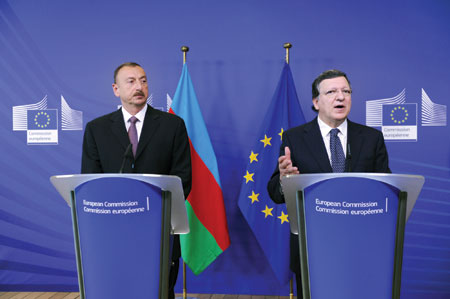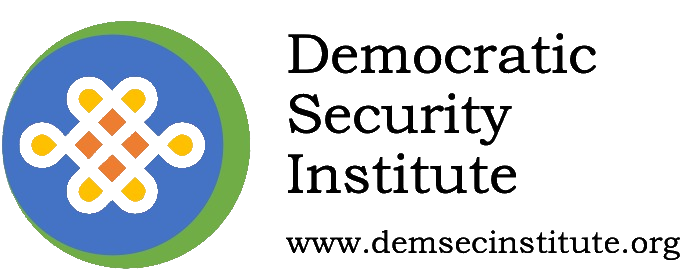Today’s Eastern Partnership Summit in Brussels represents a never-ending question for the EU: how to retain the format’s effectiveness, and maintaining motivation among all participant states given increasing divergences in what they want from the EU. So far, the three countries that have signed Association Agreements get more benefits, especially within the EaP format, while Armenia and Azerbaijan are on track to signing comprehensive new agreements outside the scope of the EaP format, and Belarus’s stance remains less clear.
The EU-Azerbaijan relationship is different and entails its own challenges, which was on prominent display during the Riga Summit with Azerbaijan’s de-facto boycott, and its preference for bilateral cooperation. In May 2015, Baku submitted a draft of a strategic partnership agreement to the European Commission, demonstrating its dissatisfaction with the EaP format. In November 2015, Baku took a symbolic and fairly unambiguous step: the State Commission of the Republic of Azerbaijan on European Integration was renamed as the State Commission of the Republic of Azerbaijan on European Partnership.

EU-Azerbaijan relations during the post-Riga period were negative, with a one year pause between the 2015 European Parliament resolution on human rights and the EU delegation’s visit in September 2016, which saw the restoration of strategic agreement negotiations with the EU. The lesson learned was the need for flexibility, and moving to the possibility of a new bilateral agreement marked a key shift for Azerbaijan and Armenia, both of which — for different reasons — turned away from the Association Agreement (AA) format back in 2013.
The EU’s approach changed following the failure of the “incentive-based approach” (more for more) with reform based tools within the EaP framework. This only worked with three countries — Ukraine, Georgia, and Moldova. Others, including Azerbaijan, diverged from cooperation and have pursued a more “tailored” relationship, based on minimal but mutually accepted modes of cooperation. As noted in the Review of Neighborhood Policy in 2015, it was acknowledged that “it has not proven a sufficiently strong incentive to create a commitment to reform, where there is not the political will.”
“The EU’s attitude towards securing Aliyev’s participation in the Summit as a way to maintain Azerbaijan’s commitment to the EaP format is hard to translate into reality.”
Since February 2017, negotiations for a new agreement have led optimists to speculate that concluding a new agreement by the Brussels Summit would represent renewed commitment to the EU by Azerbaijan. But the EU’s basic calculation has not gone well. Since September, negotiations have stagnated, as disagreements calcified over political and trade issues. It became clear that there will not be a signing of the new agreement.
However, to ensure President Aliyev’s participation, there is another possibility: the signing of a Common Aviation Area Agreement, which remains unsigned despite progress on negotiations. Yet, the EU’s attitude towards securing Aliyev’s participation in the Summit as a way to maintain Azerbaijan’s commitment to the EaP format is hard to translate into reality, and represents a short-sighted solution — even if the EU-Azerbaijan agreement were concluded in time.
Baku’s Conditions for High-Level Participation
Baku’s disappointment with the Riga summit’s “formulation” of the Nagorno-Karabakh conflict is well known, and Azerbaijani officials openly declared the need for change in September 2017. According to Deputy Foreign Minister Mahmud Mammad-Guliyev, “there was one position towards three conflicts and another toward the Armenian-Azerbaijani Nagorno-Karabakh conflict.” This condition is to secure the highest level of participation of Azerbaijani officials in the Brussels Summit; it implies a commitment for participation. However, Baku still largely rejects the EU acquis in political and economic areas, except in some sectors, which affords Baku some flexibility in ignoring EU conditionality.
In this respect, while there are not major differences in the language on Nagorno-Karabakh between the Vilnius (2013) and Riga (2015) Summit Declarations, the Azerbaijani government would like to break down the EU’s balanced approach on language of Nagorno-Karabakh conflict with the EU’s changing reaffirmation of the territorial integrity issue since 2014. The Vilnius Declaration said:
“They emphasise the need for the earliest peaceful settlement of the conflicts on the basis of the principles and norms of international law. They welcome the recent meeting in Vienna between the Presidents of Armenia and Azerbaijan with the Co-Chairs of the OSCE Minsk Group and the Presidents’ agreement to advance the negotiations toward a peaceful settlement of the Nagorno-Karabakh conflict.”
And Riga Summit Declaration, said :
“They reiterate their full support to the mediation efforts by the co-chairs of the Minsk Group on the Nagorno-Karabakh conflict, including at the level of Presidents and their statements since 2009.”
Azerbaijan’s disappointment stems from context: 2014 saw the annexation of Crimea, and the EU has emphasized territorial integrity and sovereignty for Ukraine and Georgia, including in the Riga Summit in 2015. But in that document, the EU kept a “balanced” reference to Nagorno-Karabakh, without making a clear reference to the resolution of the conflict based on Azerbaijan’s territorial integrity and sovereignty. According to one expert close to the Azerbaijani government, the “government wants to maximize the benefits they can get on Nagorno-Karabakh, such as support for territorial integrity plus either a reference to UNSC resolutions or the EP resolution of 2013, which condemns the occupation of Azerbaijan’s territory by other EaP member state.”
However, the European Parliament recommendation of 15 November 2017 to the Council, the Commission and the EEAS on the Eastern Partnership, reveals little difference in the Brussels Summit Declaration. The one difference is an increased reference to the updated Madrid Principles: “to reaffirm support to the OSCE Minsk Group co-Chairs’ efforts to solve the Nagorno-Karabakh conflict and to their 2009 Basic Principles, which include territorial integrity, self-determination and the non-use of force…”
Another issue for Baku is the declaration’s language on Russia. Baku wants to avoid highlighting Russian aggression in the in Summit Declaration, via, for instance, the condemnation of occupation of Ukrainian territory, which Azerbaijan sees as a pretext for pressure or hostility from Russia. Armenia has similar worry, which makes this notion well-understood at the EU level.
Is Mobility Enough to make the EaP attractive for Baku?
President Aliyev’s other commitment — the meeting at NATO headquarters — means that he is certain to attend the EaP Summit. However, the signing of this new agreement with Baku is a double-edged sword for the EU: keeping Azerbaijan with a new agreement would also be a way of killing the format of EaP. Keeping Azerbaijan’s interest and participation in the EaP will be another question for EU officials. Especially if the new EU-Azerbaijan agreement is signed, it will become hard to ask the Baku to be committed to the EaP format. However, visa liberalization available for all EaP countries collectively would be a way for keeping Baku in track.
However, at the Brussels Summit, the main focus will be setting up the deliverables for EaP countries. The document is titled Eastern Partnership – focusing on key priorities and deliverables. There 20 key deliverables for 2020, and visa liberalization is one of the focal points. But Armenia can access the visa liberalization process at an earlier date, while for Azerbaijan the language is vague. It is not explicit that the visa liberalization dialogue will be opened by 2020.
The other problem is that since visa liberalization began with Ukraine and Georgia, illegal immigration has reportedly increased. Some ten percent of visitors to the Schengen area do not return in the case of Gerogia. This makes it hard to open the door to another country. However, the fundamental issue is a visa liberalization dialogue — the visa liberalization action plan (VLAP) requires legislation, institutions, and implementation: a commitment and improvement to democratic credentials and the return of EU’s conditionality. Thus it is hard to expect Azerbaijan to be committed to this perspective.
Zaur Shiriyev is an Academy Associate at the Royal Institute of International Affairs (Chatham House, London) and an EDSN Fellow.
